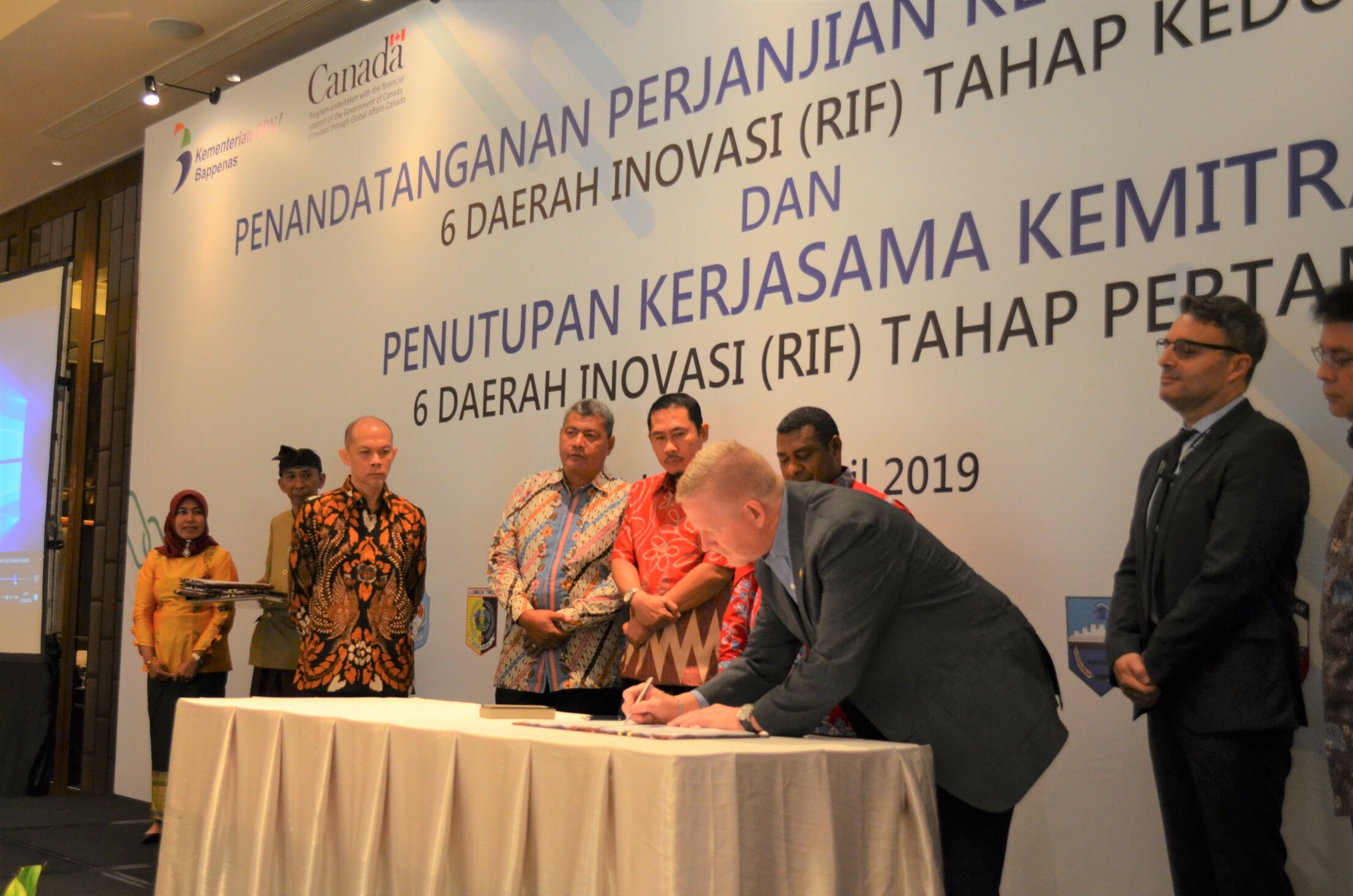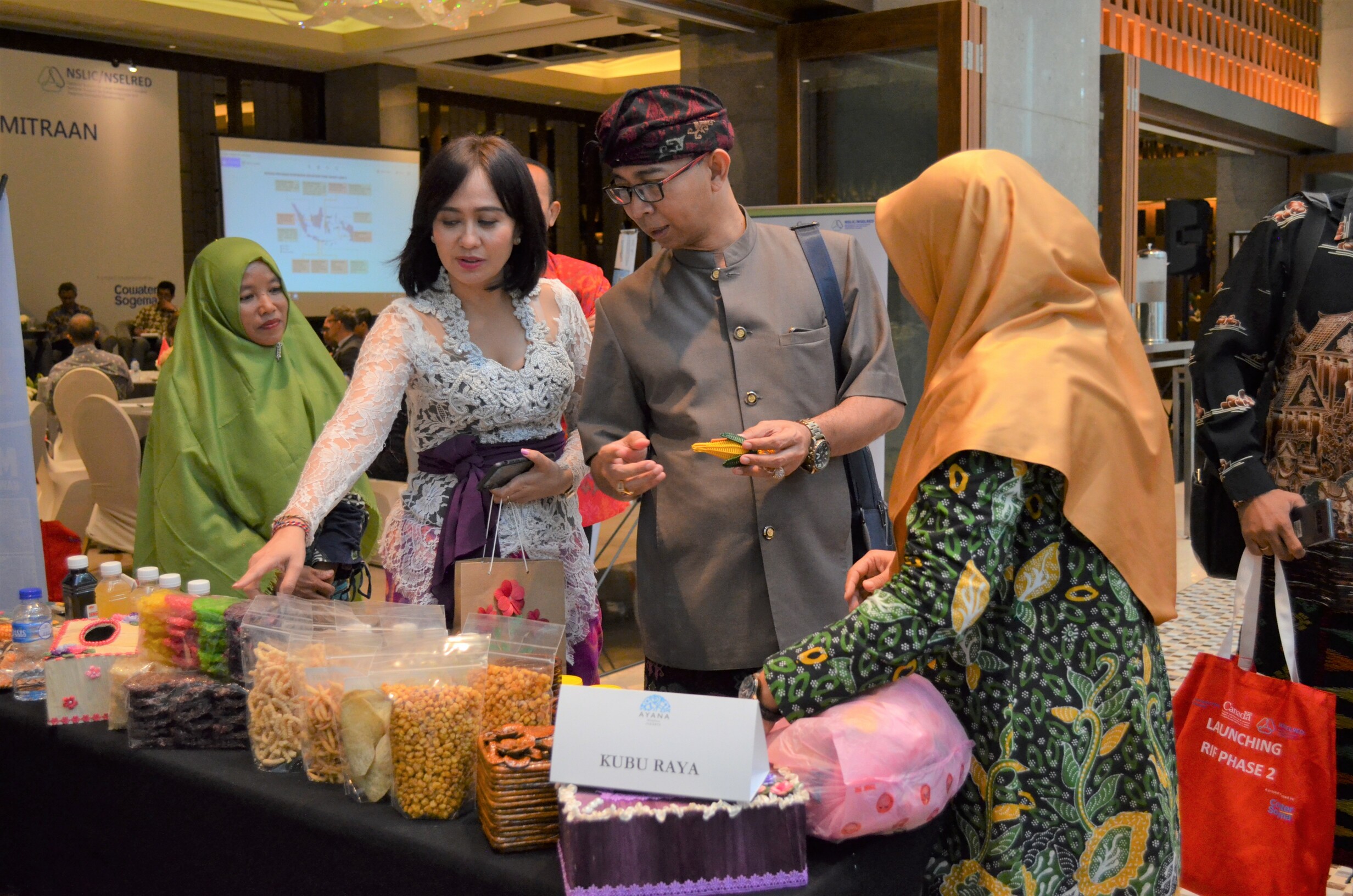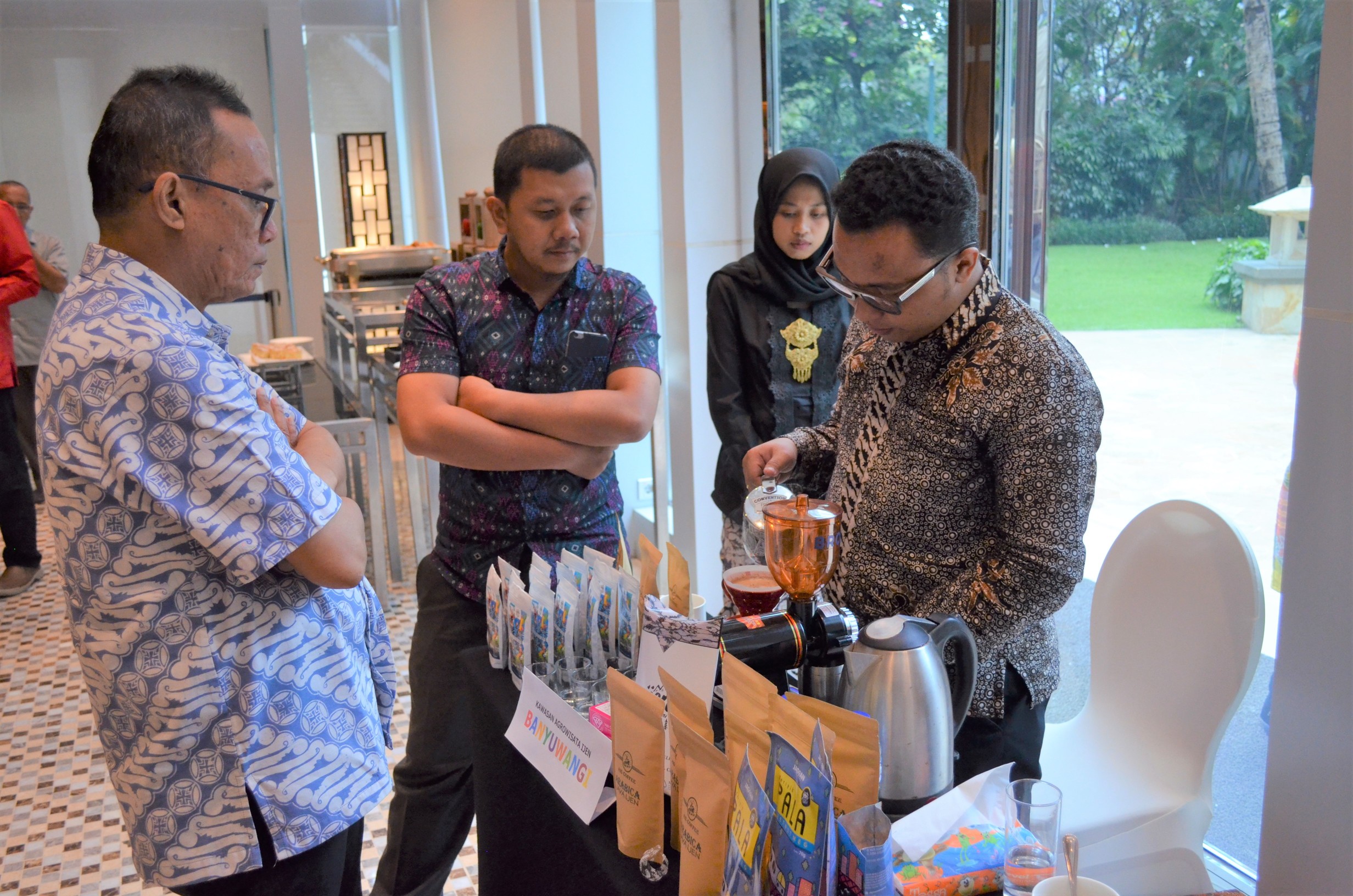JAKARTA. The National Support for Local Investment Climates/National Support for Enhancing Local and Regional Economic Development (NSLIC/NSELRED), a project implemented under the partnership of the Government of Indonesia through Ministry of National Development Planning/Bappenas and the Government of Canada through Global Affairs Canada (GAC) wraps up the successful implementation of first phase Responsive Innovation Fund (RIF) program, and at the same time to launch the second phase of RIF through a signing ceremony of Indonesia-Canada Partnership Memorandum of Agreement on April 25, 2019 at the Ayana Midplaza Hotel, Jakarta.
Global Affairs Canada’s Head of Cooperation, Pierre–Yves Monnard congratulates the national and local governments for the successful first phase of RIF and appreciate strong partnerships among the stakeholders in support of RIF. “On behalf of the Government of Canada, I would like to congratulate the representatives of six districts supported under the first phase of RIF for the successful completion of the activities. I am very happy to learn that there are so many good lessons learned and achievements of the first phase of RIF innovative projects to be shared as models for local economic development, with the second phase of RIF and others stakeholders at the district, province and national levels for potential replication and scale-up. Not just the successes but also challenges, including on ensuring the sustainability of the activities. Beyond the achievements at the local level, I also would like to congratulate the partners from the national level, coordinated by Bappenas, in bringing together resources and in their support of the initiatives at the local level. To the six recipients of RIF Phase II, I would like to wish you success in the implementation of your initiatives to contribute to local economic development in your region.” said Monnard.

The Head of Cooperation at Global Affairs Canada (GAC), Pierre–Yves Monnard signed the Memorandum of Agreement for the second phase of RIF program on Thursday, 25 April 2019, witnessed by the Deputy Minister for Regional Development at the Ministry of National Development Planning/Bappenas, Rudy Soeprihadi Prawiradinata, Ph.D (right), Executive Vice President at CowaterSogema International, Wilson Pearce (second from right) and NSLIC/NSELRED Project Director, Dr. Rino A. Sa’danoer (second from left). [Photo: ©Virgi Fatmawati/NSLIC/NSELRED]

Wilson Pearce, Executive Vice President at CowaterSogema International signed the Memorandum of Agreement together with the Regents and representatives from six districts namely Manokwari, Dompu, Mempawah, Pesisir Selatan, Kayong Utara, and Sidenreng Rappang which are selected for the second phase of RIF program. [Photo: ©Virgi Fatmawati/NSLIC/NSELRED]
The national development agenda set out in the RPJMN 2015-2019 emphasizes the importance of tangible and measurable policies and programs to accelerate the rural and regional development. Local economic development is regarded as one of main pillars in accelerating the regional development and significantly contribute to the national economic performance. In line with these objectives, the national government encourages local governments and stakeholders to carry out innovations for local economic development with the support of appropriate technical assistances. Deputy Minister for Regional Development at the Ministry of National Development Planning/Bappenas, Rudy Soeprihadi Prawiradinata, Ph.D stated, “Development of rural areas is one of the main targets that supports the development of new growth centers to accelerate national development and reduce development disparities between regions. Such initiative can be carried out through the development of local economies based on superior products in each region.”
The implementation of RIF is expected to be one of strategic initiatives to support the national government in achieving the RPJMN 2015-2019 targets. NSLIC/NSELRED Project Director, Dr. Rino A. Sa’danoer said, “The partnership between the Governments of Indonesia and Canada through NSLIC/NSELRED Project provides a Responsive Innovation Fund of IDR 1 billion per year for each of the 18 National Priority Rural Areas (KPPN) through RIF scheme. To implement RIF at the local level, we closely collaborate with the Local Governments, the Regional Development Planning Agency (BAPPEDA), the Regional Development Planning, Research and Development Agency (BAPPELITBANGDA), Regionally-Owned Enterprises (BUMDA, BUMNEGMA, BUMDESMA and BUMDES), MSMEs and other relevant stakeholders to create and incubate innovations for local economic development that adhere to the environmentally friendly, gender responsive and good governance principles. Through RIF, we hope to boost local and regional economic development and increase the investments climate through innovative approaches such as the development of local superior products and economic sectors chosen by the respective local governments.”
The first phase of RIF which was implemented from March 2018 to April 2019 has resulted impressive progress. About 6,105 beneficiaries includes the local governments, private sector, academics, research institutions and communities have received capacity building through 209 training and technical assistances in the areas of institutional capacity development, product development, market expansion and employment creation with equal opportunities for both men and women. Local economic development based on superior products in the agricultural sector such as Neera, Coffee, Snake Fruit, Coconut, Sago, Corn, organic rice and organic fertilizers; in the fisheries/marine sector such as processed fish, shrimp paste, crackers and seaweed; as well as in the tourism and crafts sectors have opened job opportunities for at least 2,929 people.
The six regions/districts that have successfully implemented the first phase of RIF program are: 1) Nikosake Region in Tabanan district, Bali province; 2) Luwita Region in Pinrang district, South Sulawesi; 3) Pulau Tujuh Palaga Region in Central Maluku district, Maluku; 4) Praya Region in East Lombok district, West Nusa Tenggara; 5) Rasau Raya Region in Kubu Raya district, West Kalimantan; and 6) Ijen Region in Banyuwangi district, East Java. Meanwhile, for the second stage of RIF to implement from April 2019 to April 2020 will support another six districts: 1) Manokwari district, West Papua; 2) Dompu district, West Nusa Tenggara; 3) Mempawah district, West Kalimantan; 4) Pesisir Selatan district, West Sumatra; 5) Kayong Utara district, West Kalimantan; and 6) Sidenreng Rappang district, South Sulawesi.
The first phase of RIF program close-out and the launch/MoU signing for the second phase of RIF ceremony held on April 25, 2019 was attended by representatives from the Canadian Embassy for Indonesia and Timor Leste; Global Affairs Canada (GAC); technical ministries/agencies such as Ministry of National Development Planning, Coordinating Ministry for Economic Affairs, Coordinating Ministry for Human Development and Cultural Affairs, Ministry of Home Affairs, Ministry of Village and Disadvantage Areas; Ministry of Cooperatives and SMEs, the Investment Coordinating Board (BKPM), etc.; multilateral/bilateral cooperation; embassies; donors and development partners; Regents, Bappeda, private sectors; investors; bank/non-bank and media.
Among the respected participants include the Deputy Minister for Regional Development at the Ministry of National Development Planning/Bappenas, Rudy S. Prawiradinata, Ph.D; the RIF Co-chairs (Ministry of National Development Planning/Bappenas’ Director for Disadvantaged Regions, Transmigration and Rural Development (represented by its former Director — currently the Bappenas’ Director for Regional Development and Special Zones, Sumedi Andono Mulyo, Ph.D), and Global Affairs Canada’s Senior Development Officer, Jeffrey Ong); NSLIC/NSELRED Project Director/RIF Implementing Team Lead, Dr. Rino A. Sa’danoer; the RIF National Team (Directorate of Disadvantaged Regions, Transmigration and Rural Development (Daerah Tertinggal, Transmigrasi, dan Perdesaan/DTTP) at Bappenas; Directorate of Development of SMEs and Cooperatives at Bappenas; Directorate of Village Government Development (Bina Pemerintah Desa) at Ministry of Home Affairs; Directorate of Rural Area Development Planning (Perencanaan Pembangunan Kawasan Perdesaan/PPKP) at Ministry of Village and Disadvantage Areas; Ministry of Cooperatives and SMEs; the Investment Coordinating Board (Badan Koordinasi Penanaman Modal/BKPM); Coordinating Ministry for Human Development and Cultural Affairs; and NSLIC/NSELRED Senior Manager LRED, Natalis Padang); the RIF Secretariat team; RIF Regional Management team and beneficiaries.
Meanwhile, the Memorandum of Agreement for the six districts of the second phase RIF are officially signed by the Ministry of National Development Planning/Bappenas and other technical ministries; Global Affairs Canada’s Head of Cooperation, Pierre-Yves Monnard; Executive Vice President of CowaterSogema International, Wilson Pearce and the Regents or representatives from the six districts selected for the second phase of RIF.

Ministry of National Development Planning/Bappenas’ Director for Regional Development and Special Zones, Sumedi Andono Mulyo, Ph.D (third from right) accompanied by NSLIC/NSELRED RIF Coordinator, Wulan S. Mayaversa (second from right) visited a booth displaying fisheries products developed by RIF-supported women groups in Lombok Timur district. [Photo: ©Virgi Fatmawati/NSLIC/NSELRED]

The RIF-supported local government of Tabanan district enjoyed exchanging their experiences in developing local products with another RIF-supported women group from Kubu Raya district, West Kalimantan province. [Photo: ©Virgi Fatmawati/NSLIC/NSELRED]

Banyuwangi coffee, a superior local product endorsed by RIF to support the tourism development in the district, drew the attention of RIF event participants. [Photo: ©Virgi Fatmawati/NSLIC/NSELRED]
This event is expected to facilitate policies mapping and encourage strategic contributions from relevant partners at the national and local levels to support the successful implementation of the second phase of RIF and ensure the smooth exit strategy for the first phase of RIF. It is in line with the objective of NSLIC/NSELRED project in support of accelerating the local and regional economic development and improving the investments climate for the sustainable national development.
Written by Virgi Fatmawati/NSLIC/NSELRED
No Comment
You can post first response comment.